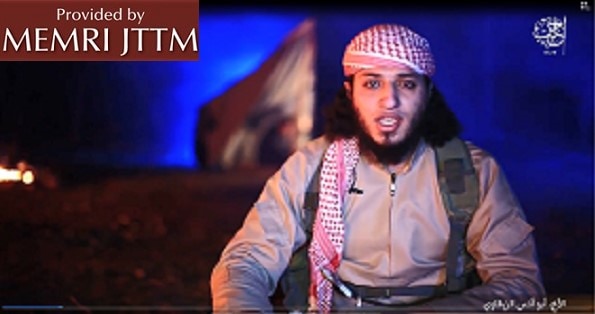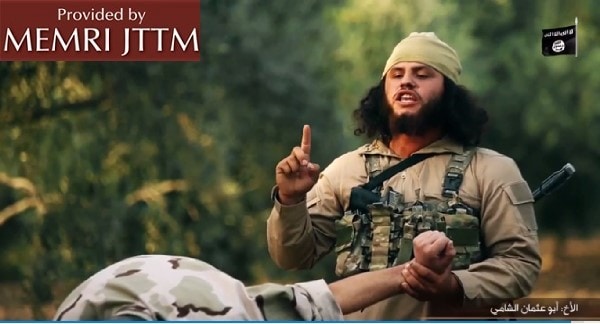The following report is now a complimentary offering from MEMRI's Jihad and Terrorism Threat Monitor (JTTM). For JTTM subscription information, click here.
On January 20, 2017, the media office of the Islamic State (ISIS) Aleppo province released a 28-minute video titled "Between Two States – Challenges and Rewards," which highlights the challenges encountered in the early Islamic state by the Prophet Muhammad and his rightly guided caliphs in their spreading of Islam, and their rewards that came from God,[1] and likens them to the challenges faced in our time by ISIS's Caliphate State. The video was posted on the jihadi forum Shumoukh Al-Islam.[2]

ISIS's Challenges Compared To Those In Early Islam
The video begins as a previously released audio recording of ISIS leader Abu Bakr Al-Baghdadi[3] plays in the background; in it, Al-Baghdadi recaps the challenges encountered and sacrifices made by ISIS in the past decade until they declared the new Islamic Caliphate. An unidentified narrator then speaks about wars and expeditions in the early Islamic state, noting the severe challenges faced by the Muslims, led by the Prophet Muhammad, when spreading Islam. The narrator next highlights the early Muslim victory in the Battle of the Trench (Ghazwat Al-Khandaq), led by Muhammad against the unbelievers in Mecca, ultimately forcing them to recognize the political and religious strength of Muhammad and the Muslim tribes who joined him from Medina.
The significance of this battle is further highlighted in the video by an ISIS fighter identified as Abu Anas Al-Zarqawi, who explained that the hardships experienced by the Muslims and Muhammad in it were the same as the hardships the Islamic State faces today, noting: "The infidels have allied today against the Islamic Caliphate; they have mobilized, gathered, and partnered to extinguish the light of Allah and demolish the success of the Caliphate." He then said that the period after Muhammad's death had presented the Islamic community with its first major challenge, as panic spread across the Arabian Peninsula because tribes abandoned Islam, and because Muhammed had not appointed a successor and a dispute broke out over who should succeed him as leader of the Muslims. The Muslims met this challenge by establishing the institution of the Caliphate and ensuring the continuity of early Islam and the rightly guided caliphs successfully defended Medina, the capital of the Islamic State, from the predatory reach of apostates.
After this grave challenge for the rightly guided caliphs, the video's narrator said that the conquest reached Iraq and Sham (Syria). Asserting that "rewards originate from challenges" and "the nation never dies by the death of the men," he noted that Islam's conquests had never stopped after the death of Muhammad's first successor, Abu Baker Al-Saddiq, but were continued by the next caliph, Omar Bin Al-Khattab.
SUPPORT OUR WORK

"The Crusaders Thought That They Had Killed All The Jihadis But They Didn't Know That The Next Phase Of The Fight Would Be Even More Fierce"
Enumerating the multiple challenges encountered by the ISIS fighters in establishing their Caliphate, including the loss of life, imprisonment, and martyrdom, the narrator confirmed that despite all this, the Caliphate State of ISIS was established and spread to many countries across the world, and added: "The enemies have failed to comprehend Allah's plan for his people; the Crusaders thought that they had killed all the jihadis but they didn't know that the next phase of the fight would be even more fierce."

ISIS fighter Abu Anas Al-Zarqawi
Stressing that after ISIS formally declared caliphate, the tyrants [America with their allied Arab countries] did not like to see the Muslims living with dignity in an Islamic State that they had built with the martyrs' blood and scattered flesh, the narrator goes on to label the Arab countries that allied with and participated in the U.S.-led air campaign against ISIS "hypocrites and cowards," accusing them of recognizing America as a "capable power that can do everything." Stating that the Americans have not learned from their mistakes, and that the Sahawat (Awakening) has not learned this lesson, he vowed that the ISIS fighters would treat the "apostate" Americans and Sahawat just like Muhammad treated the Banu Qurayza.[4]
Footage Of Operations Against Turkish Troops, Execution Of Sahawat Soldier
Next, the video featured footage showing various ISIS operations against Turkish troops, some of the war booty taken by the jihadis, and one jihadi speaking in Turkish, stepping on the Turkish flag, and demanding that the Turkish soldiers repent and fight for the sake of Allah.

A Turkish ISIS fighter demanding Turkish soldiers repent
The video concludes with the execution by shooting of a captured Sahawat soldier by an ISIS fighter identified as Abu Othman Al-Shami. Prior to the execution, Al-Shami threatened to kill all the Sahawat who work with the Americans, saying: "The power of America is vanishing, and the power of Allah is lasting." He added that the captured soldier had confessed that his training had been supervised by an American officer accompanied by a translator. The narrator then stated, against the backdrop of a footage of an ISIS fighter executed by a Sahawat rebel early last year, that the execution of this Sahawat fighter is "identical revenge."

Executing the Sahawat soldier
[1] For example, the first reward, in the Battle of Trench, was God responding to Muhammad's prayers by sending the Angel Gabriel to give him the good news that the enemy army would be scattered by a wind.
[2] Shamukh.net/vb, January 20, 2017.
[3] See MEMRI JTTM report ISIS Leader Al-Baghdadi Responds To Military Campaign To Retake Mosul, Urges ISIS Soldiers To Remain Strong, Calls For Attacks On ISIS's Enemies, November 2, 2016.
[4] The Banu Qurayza were a Jewish tribe that lived in northern Arabia, at the oasis of Yathrib (now known as Medina), until the 7th century, when their conflict with Muhammad led to their extermination. In the Battle of the Trench, the tribe was charged with treason and besieged by the Muslims under Muhammad's command; they eventually surrendered, and all the men, apart from a few who converted to Islam, were beheaded and the women and children enslaved.




